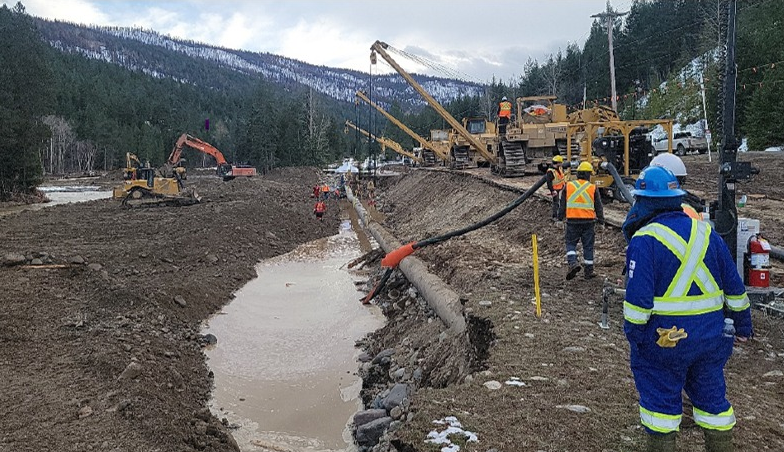Trans Mountain’s chief operating officer says the pipeline will likely return to full capacity in late January at “the earliest” as work continues after flood fallout that will cost tens of millions of dollars.

The January estimate falls more than a month after the company previously said it would resume normal supply.
The critical pipeline shut down on Nov. 14 as a precaution following floods in the area of Hope, B.C., and came back online last week, allowing gas rationing in southern British Columbia to end Tuesday.
The 21-day shutdown marked the longest in the pipeline’s 68-year history, said Michael Davies, head of operations at the federally owned company.
“The pipe is still running at a lower pressure. We’re armouring riverbanks and re-bedding pipe where it was scoured out,” Davies said in a phone interview. “We may still have some further pipe repairs to do, more permanent repairs.
“It’s easily in the tens of millions, many tens of millions of dollars,” he added.
The ongoing work means full capacity is likely to be nearly two months away.
“The earliest that we could be back — late January is probably the time frame that we’re talking about, but it’s still uncertain at this time,” Davies said.
Trans Mountain said in an email Tuesday it expects to deliver more than 75 per cent of “normal volumes” to its customers over the month of December, with capacity varying from day to day.

In a Dec. 6 release about the pipeline’s return to service, it had said supply levels would “return to normal levels within a week.”

Get daily National news
The company, which runs Canada’s only pipeline system carrying oil from Alberta to the West Coast, typically pumps about 300,000 barrels of oil per day between Edmonton and Burnaby, B.C.
That flow came to a standstill in mid-November as sections of highway were washed out or swept away by landslides amid multiple atmospheric rivers.
About 400 crew members remain in the field, largely to assess weak points and strengthen infrastructure rather than repair the pipes themselves, Davies said.

With vital supply links cut — the Coquihalla Highway remains closed — Trans Mountain deployed seven helicopters including a logging chopper to haul downed trees. It also built a bridge over the Coldwater River, he said.
“The biggest challenge was access. There was only one location where we actually had repairs that we had to do physically to the pipe.”
Some of the contractors were reassigned from the $12.6-billion Trans Mountain expansion project.
Torrential rains impeded progress on parts of that twinned pipeline, which Davies said is now more than 40 per cent complete. But overall the expansion has continued “without much disruption,” he said, adding that it’s too early to tell whether the impact will push it past the completion goal of late 2022.
The company spends millions of dollars annually on a geohazard program that monitors river crossings and landslide-susceptible soils, he said. It also runs emergency preparedness exercises throughout the year.
Werner Antweiler, an economics professor at the University of British Columbia’s Sauder School of Business, said companies and governments need to shore up infrastructure in preparation for weather events that will arrive with greater frequency and intensity amid a warming planet.
“We have to store supplies and equipment in advance of such events, so that they can respond quickly and deploy these assets,” he said.

Calgary-based Parkland Corp.’s Burnaby refinery can process up to 55,000 barrels a day of crude and synthetic oil into gasoline, diesel, propane and other fuels. It also has 13 storage tanks that can hold up to 1.6 million barrels.
“But they were running dry,” Antweiler said.
“If you do the math, that’s about 29 days’ worth of processing. If these tanks had all been full, they could have kept on running for that duration,” he said of the three-week pipeline closure.
The refinery said on Nov. 23 it would pause operations due to a lack of crude oil supply from Trans Mountain.
The pipeline provides between one-quarter and one-third of the volume to four large refineries in Washington state and, via the Burnaby plant, remains the largest source of motor fuel for Lower Mainland and Vancouver Island residents, Davies said.
- Danielle Smith promises Alberta referendum over immigration, Constitution changes
- Real Canadian Superstore fined for ‘misleading’ Product of Canada displays
- ‘No reason to continue discussing’: Ontario mayor wants Andrew’s name dropped
- Canadian Tire says Triangle Rewards are its ‘linchpin’ for growth






.jpg?h=article-hero-560-keepratio&w=article-hero-small-keepratio&crop=1&quality=70&strip=all)
Comments
Want to discuss? Please read our Commenting Policy first.